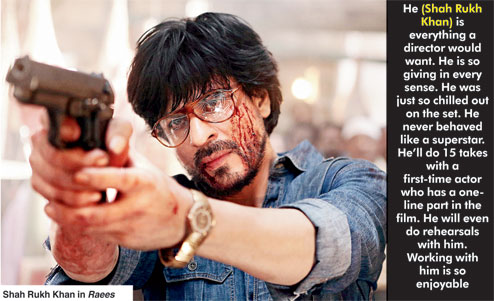
Rahul Dholakia has a lot to celebrate. After many a delay, his Shah Rukh Khan biggie Raees finally released to big box office last Thursday. t2 met the director at Mehboob Studio in Mumbai’s Bandra to talk about the film, the delays and, of course, SRK.
You’ve maintained that Raees is not based on the life of gangster Abdul Latif. So where did the idea germinate?
Some friends of mine in the US own liquor stores and they suggested that I make a film on prohibition. They wanted to fund a film on the subject. I think Boardwalk Empire (acclaimed TV series on mobsters, starring Steve Buscemi) was airing in the US at the time. I have always been a big fan of gangster films, so I thought I’ll give it a shot.
Making it in India meant that I base it in Gujarat which has had prohibition for so many years. I am from Gujarat, so I know the milieu.
I reached out to journalists who had done extensive research on prohibition. We travelled all across Gujarat. It took us two years to write the script.
There was a defamation case filed by Abdul Latif’s family...
Ya, but this film has nothing to do with him or any other real person. It’s an original story.
How did you get Shah Rukh on board?
While I was writing it, I realised that the film has become larger than anything I had ever made. Initially, this was supposed to be an indie with Nawaz (Nawazuddin Siddiqui) as the cop. I wasn’t getting enough funding. Dimple Kapadia recommended that I meet Farhan (Akhtar) and Ritesh (Sidhwani). They loved the script and agreed to produce it. They asked me for my top five choices to play Raees. I had only one name... Shah Rukh Khan. Ritesh started laughing!
The first time I met Shah Rukh, he had given us a 10-minute window. That narration finally lasted 45 minutes. By the interval point, he said that he was doing the film. His only question was why I wanted to cast him. I told him there’s a line in the film that describes Raees and him too. Instantly he said, ‘Baniye ka dimag aur miyan bhai ki daring’? It was amazing how quickly he got the film and the character!
In the past, your films (Parzania and Lamhaa) have been smaller and more intimate. Did you require a different approach to make a Shah Rukh Khan film?
Not really. The script itself was larger-than-life. There was a whole world around him that is nuanced and layered. The scale of the film never intimidated me. Fortunately, neither Shah Rukh nor Farhan nor Ritesh put any kind of pressure on me. It was only during the promotions of the film that it finally hit me that I’ve made the film with Shah Rukh Khan! He was just so chilled out on the set. He would sit down to eat with the whole unit. He never behaved like a superstar.

This film has been in the making for a long time. SRK was injured and then he finished other films before getting back to Raees. Did that worry you at any point?
We did have some scheduling issues. Our break was for seven months because of the monsoons. He shot Dilwale in that break. I managed to spend some time in the US with my mom. I also managed to re-edit the film. Thankfully, none of us lost any focus and it all worked out in the end.
Shah Rukh has famously said that he works with directors who love him. You didn’t know him at all before you started working…
Yeah! So we got to know each other during this movie and I love him now! (Laughs) Not just me, I think my whole unit loves him. He is everything a director would want. He is so giving in every sense. He’ll do 15 takes with a first-time actor who has a one-line part in the film. He will even do rehearsals with him. I know of so many actors who won’t even give cues to other actors. Working with him is so enjoyable.
Now that Raees has released, what’s next for you?
I want to go and spend time with my mom. She was supposed to come here from the US, but couldn’t. In terms of work, I don’t know what I am going to do next. My focus has always been on the story I want to tell and not the budget or the star cast. That’s not going to change. Working with big stars does help, but that won’t be my criteria for picking a film.
Karishma Upadhyay











